|
|
| |
|
|
|
With the release of the
third James Bond film Goldfinger in 1964, there were more marketing
tie-ins and licensed products issued to satisfy public demand and cash-in
on the growing worldwide cult of ‘Bondmania’. Goldfinger offered
many promotional opportunities suggested by its story, which included
those with jewellery stores, sporting equipment manufacturers and sports cars on both
sides of the Atlantic. With its fanciful storyline, Goldfinger
also offered marketing tie-ins with products aimed at children, rather
than the more adult oriented promotions of the first two films in the EON
Productions series.
|
|
|
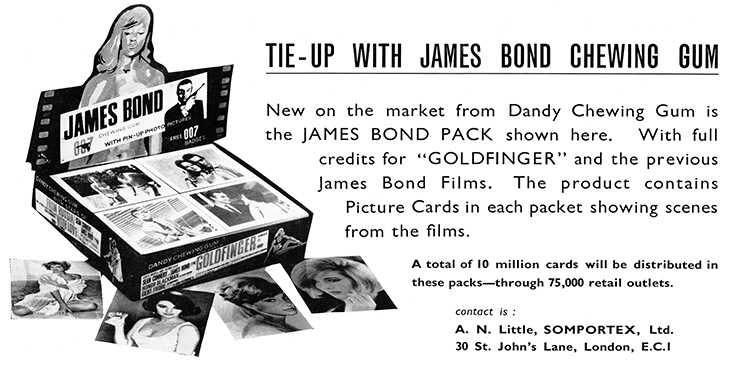 |
|
As the James Bond Films
were granted an ‘A’ certificate by the British Board of Film Censors, this
meant that children under the age of 12 must be accompanied by their
parent or adult guardian, but this did not necessarily stop millions of
underage cinemagoers from seeing the films. The first James Bond licensed
product specifically aimed at the children's market was ‘James Bond 007
Chewing Gum’. Produced by Somportex of London, the cards were
actually manufactured by Danish confectioner Dandy. The packs
available in the UK contained one piece of dusted pink chewing gum and
three black & white pin-up cards (known in the USA as Trading Cards).
There were 60 cards in total*, so this
marketing model offered the opportunity for repeat purchases as eager
children swapped cards in the school playground in an attempt to acquire a
full set. The 60 cards featured scenes and photos from Goldfinger
(1964), From Russia With Love (1963) and Dr. No (1962).
After purchasing the packs there was also the opportunity to send off 12
wrappers with a stamped, self-addressed envelope to receive a free 007 pin
badge. Whilst this affordable pocket money priced (two pennies)
collectible appeared inexpensive, the fact that the acquisition of a whole
set would require multiple purchases (with no guarantee of which cards
you'd get inside) made this a very lucrative promotion for Somportex,
who also issued similar cards for other popular film and TV series of the
period. However, the content of some of the cards proved somewhat
controversial, and a prominent news item appeared on the front-page of the
tabloid newspaper Daily Mirror on December 3, 1964, some three
months after Goldfinger had been released in UK cinemas. |
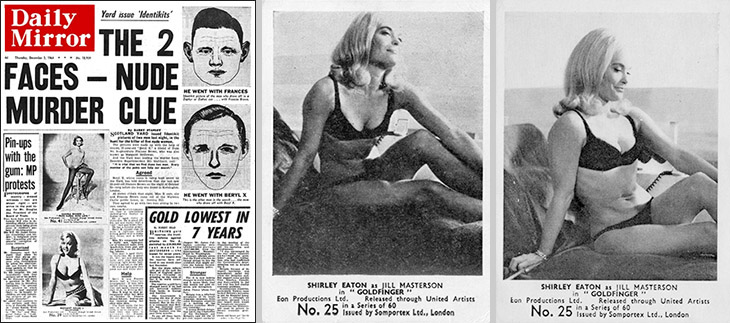 |
|
The James Bond cards
featured as front page headlines on December 3, 1964, when the
Daily Mirror reported that a member of Parliament complained that
the photo content of bikini-clad girls was “a disgusting and
disgraceful corruption of young children.” The controversial cards
were also featured on Bernard Braden's late-night ITV consumer affairs
television show On The Braden Beat (1962-1967), which
frequently attracted an audience of 12-million viewers. As a result of
the negative media coverage Somportex withdrew the original set
and issued a new version in 1965. The images chosen for the 1965 set
were all different to the original release, with four publicity shots
of James Bond's Aston Martin DB5 now included. Card numbers 43-47 were
reproductions from the article ‘The Guns of James Bond’ by Ian
Fleming, lifted directly from The Sunday Times Colour Supplement
of November 18, 1962 – for which they were originally illustrated.
The point-of-sale packaging was now green, and the number of cards
reduced to 50 following the removal of the saucier pin-ups!
The
1965 set also had descriptive text printed on the reverse of each
card. The new set was titled The Exciting World of James Bond
007, with the free pin badge offer still in operation, but a new
graphic of James Bond in the famous gun-across-chest pose seen on the
wrapper. |
|
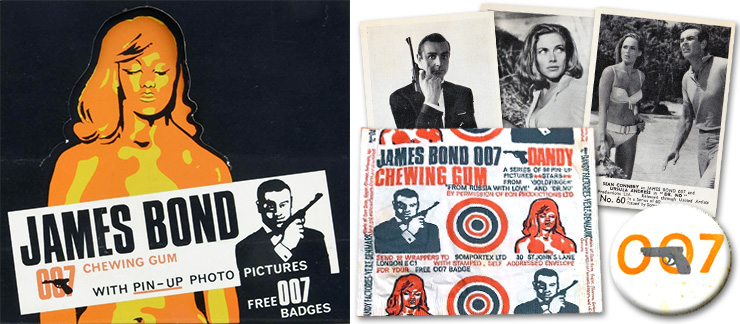 |
|
*Originally, card
No. 25
[pictured above right] was
printed twice with Shirley Eaton in different poses - so the complete set was
actually comprised of 61 different images.
Sean Connery's arm was also
retouched out of card No. 49, so he does not appear to be fondling Zena
Marshall's backside! Several of the more suggestive images featuring the
Bond Girls were also printed again, though in slightly cropped versions
showing less exposed flesh than seen in the original card set. |
 |
|
To tie-in with the golf
game between James Bond and Auric Goldfinger, The Rank Organisation
Theatre Division publicity department (the company who distributed
Goldfinger in the UK) devised a leaflet contest run through golfing
equipment stockists,
Professional Golf Shops and cinemas on the Rank Distribution Circuit
showing Goldfinger. Participating theatres received a James Bond
cut-out and an expensive golf club for display purposes. Rank also
arranged for British sports equipment manufacturer Slazenger to
supply two double-crown posters
and up to 2,000 leaflets for the “Goldfinger” competition for which a complete
set of ‘Jack Nicklaus’ golf clubs was the first prize; a Slazenger
golf bag as second prize; with third and fourth prizes of Slazenger
Challenge tennis rackets, and 30 prizes of golf and tennis balls.
Slazenger representatives received two complimentary tickets to see
Goldfinger (although not to weekend screenings) and Rank asked
that they be treated courteously for selling the film to the
golfing world. |
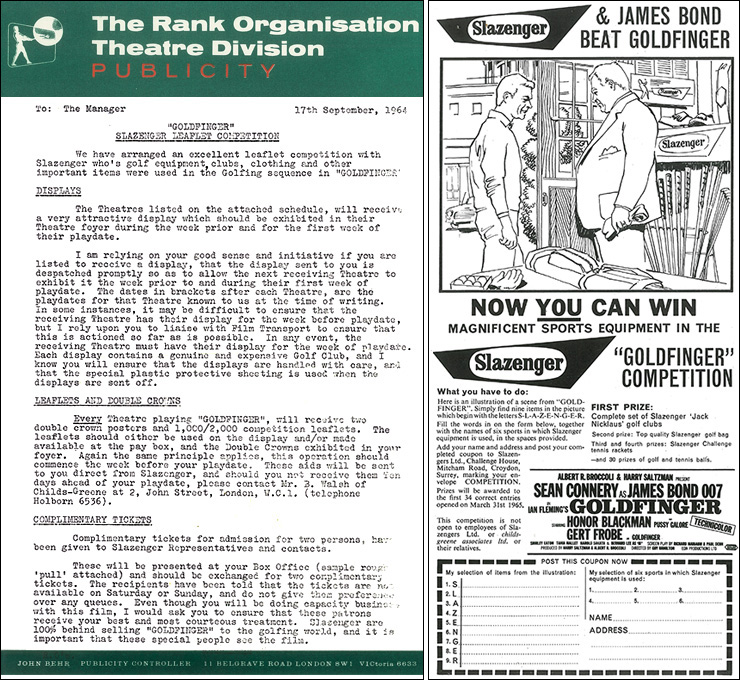 |
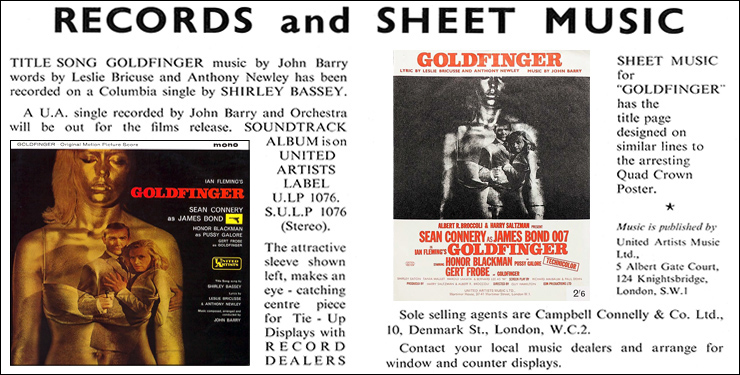 |
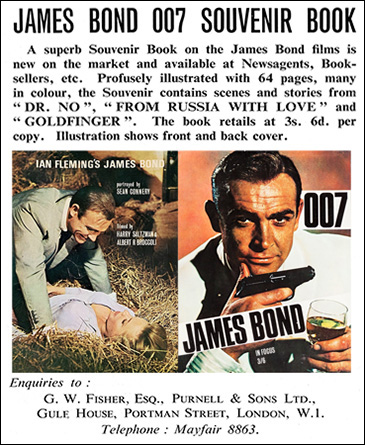 |
Once again the music of
Goldfinger played an important part of the promotion for the film,
with Shirley Bassey's Columbia Records single, John Barry's Original
Soundtrack Album, and Sheet Music all available in September 1964.
Unusually, the US release of the soundtrack album issued on December 12,
1964 omitted the tracks ‘Golden Girl’, ‘Death of Tilly’, ‘The Laser
Beam’ and ‘Pussy Galore's Flying Circus’. However, the shorter US edition
went on to become a best-seller, reaching Number One on March 20, 1965 and
was the most popular album in the US
chart for three weeks, and awarded a gold disc signifying over $1-million
in sales.
One of the most
significant promotional items issued to tie in with the release of
Goldfinger (1964) [and also featuring stills from Dr. No
(1962) and From Russia With Love (1963)], was the publication James Bond In
Focus. The profusely illustrated 64-page softcover Souvenir Book from Purnell & Sons Ltd., published by arrangement with Mervyn Brodie
Associates Ltd., the company who had recently teamed up with
DANJAQ S.A. (later DANJAQ LLC) and Glidrose Productions to administer
the licensing on a royalty basis for “James Bond” and “007” related
products in the UK. The
book was also published in the USA by Dell under the title
Ian Fleming's James Bond 007 portrayed by Sean Connery, with a
different front and inside front cover. |
|
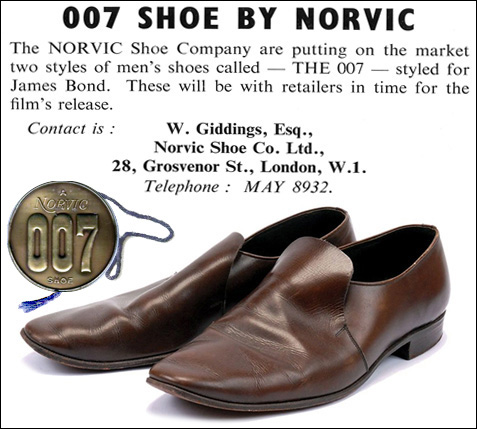 |
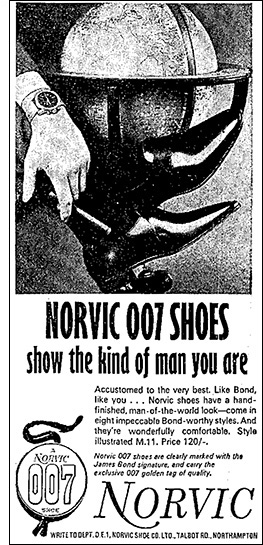 |
|
British footwear manufacturer NORVIC released two styles of men's leather
shoes branded ‘The 007’. The brown and black leather designs had “A
Norvic styled product for James Bond” embossed on each inner sole, and
came with a bronze tag with “A Norvic 007 shoe” embossed on each
side. The shoes were heavily promoted in daily national newspapers
with a number of different advertisements. |
|
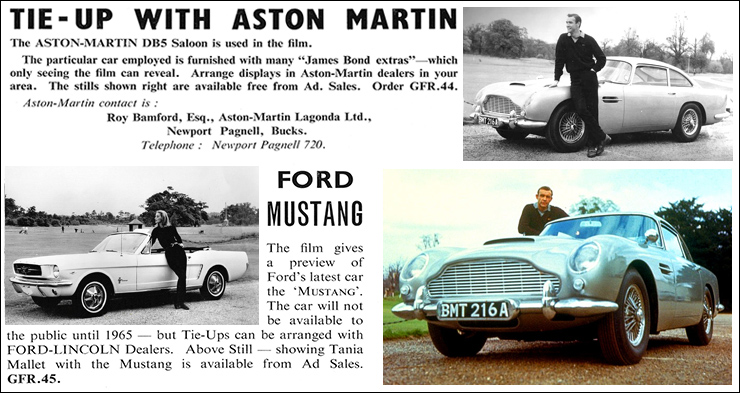 |
|
The Exhibitors’ Campaign
Book also suggested tie-ins with Aston Martin dealers to showcase the DB5
Saloon featured prominently in Goldfinger (1964). Without giving
away any of the “James Bond extras” which only seeing the film would
reveal, it was suggested that Aston Martin dealerships arrange displays to
promote the vehicle. Similarly, FORD-LINCOLN dealers were encouraged to
promote the Ford Mustang driven by Tilly Masterson (Tania Mallet) in
Goldfinger, although the car itself would not be available to the
public until 1965. Tania Mallet posed for a series of publicity
photographs with the Ford Mustang at Stoke Poges Golf Club close to
Pinewood Studios in late April 1964 during the filming of the match
between James Bond (Sean Connery) and Auric Goldfinger (Gert Frobe). |
 |
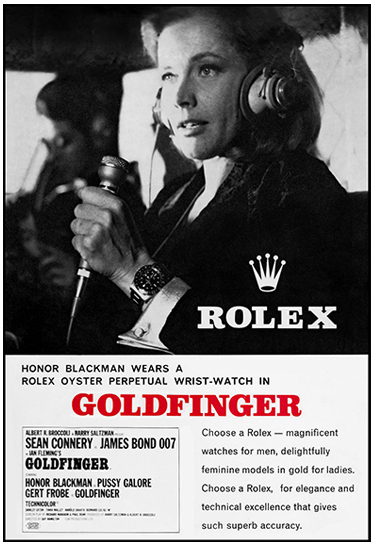 |
Although a ROLEX
watch was worn by Sean Connery in his first three James Bond films
[and later in Thunderball (1965)], Honor Blackman was selected
to appear in promotional material for Goldfinger (1964). A
simple two-colour Display Card was available to advertise the feminine gold model
Oyster Perpetual Wrist-Watch which is seen prominently in the
film as Pussy Galore pilots Auric Goldfinger's Lockheed JetStar.
The uncropped still [below] showed co-pilot Sidney (played by Tricia
Muller [uncredited]) reading Vogue magazine
with Tania Mallet on the cover. |
|
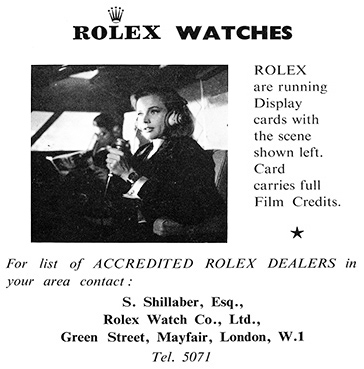 |
|
|
 |
 |
|
|
|
|
|









